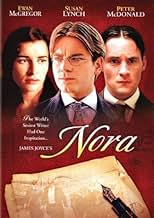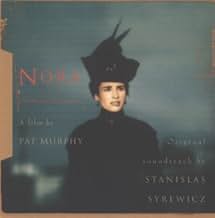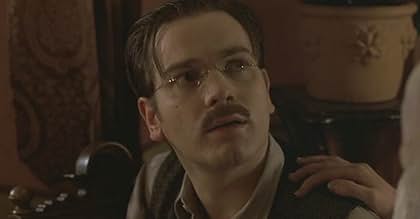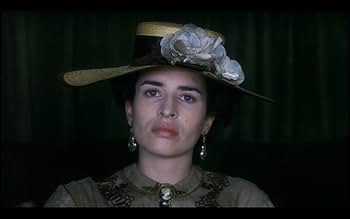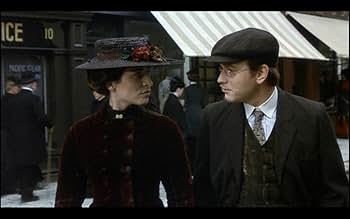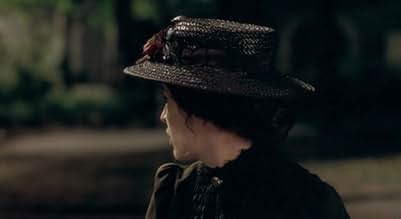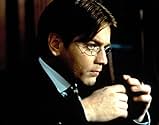NOTE IMDb
5,9/10
1,9 k
MA NOTE
Ajouter une intrigue dans votre langueDublin, 1904, James Joyce chats up Nora Barnacle, a hotel maid recently come from Galway. She enchants him with her frank, uninhibited manner, and before long, he's convinced her to come wit... Tout lireDublin, 1904, James Joyce chats up Nora Barnacle, a hotel maid recently come from Galway. She enchants him with her frank, uninhibited manner, and before long, he's convinced her to come with him to Trieste.Dublin, 1904, James Joyce chats up Nora Barnacle, a hotel maid recently come from Galway. She enchants him with her frank, uninhibited manner, and before long, he's convinced her to come with him to Trieste.
- Réalisation
- Scénario
- Casting principal
- Récompenses
- 3 victoires et 7 nominations au total
Vinnie McCabe
- Uncle Tommy
- (as Vincent McCabe)
Avis à la une
Writer's lives are always a difficult subject for the screen, and even with the wealth of biographical and autobiographical material about James Joyce, he remains no exception. This movie, concentrating on the early part of his relationship with the humorously-monikered Nora barnacle makes a reasonable enough attempt to bring cinematic life to this complex and enigmatic figure.
Ewan McGregor, in the role of Joyce is sometimes a bit too young and sexy to convey his subjects brooding, promethean intensity, but he's certainly more convincing than Bosco Hogan in Joseph Strick's Portrait of an artist. The real star of the film is Susan Lynch, whose earthy sexuality convinces us that she could develop into the Molly Bloom of Ulysses. There's also good support from the actor playing Joyce's more level-headed brother and soi-disant "keeper", Stanislaus.
The movie is often affected by the exaggerated Irishness that seems to blight every movie set in the island, but it doesn't get in the way of the film's verisimilitude too much, with one exception. When Joyce's brother takes his book to an Irish publisher, he is told that "there's something dirty going on" in "The Dead" and this is presented as a uniquely Irish reaction, though in reality Joyce had the same reaction everywhere.
The film is also punctuated by subtle allusions to Joyces work that literati will enjoy picking up, but won't alienate those poor hordes of non-Joyceans too much. At the risk of sounding like a swotty pedant, there's a lot of profane language in the movie, which Joyce maintained he never used in speech, though it serves, if anything to increase the characters' believability.
Ewan McGregor, in the role of Joyce is sometimes a bit too young and sexy to convey his subjects brooding, promethean intensity, but he's certainly more convincing than Bosco Hogan in Joseph Strick's Portrait of an artist. The real star of the film is Susan Lynch, whose earthy sexuality convinces us that she could develop into the Molly Bloom of Ulysses. There's also good support from the actor playing Joyce's more level-headed brother and soi-disant "keeper", Stanislaus.
The movie is often affected by the exaggerated Irishness that seems to blight every movie set in the island, but it doesn't get in the way of the film's verisimilitude too much, with one exception. When Joyce's brother takes his book to an Irish publisher, he is told that "there's something dirty going on" in "The Dead" and this is presented as a uniquely Irish reaction, though in reality Joyce had the same reaction everywhere.
The film is also punctuated by subtle allusions to Joyces work that literati will enjoy picking up, but won't alienate those poor hordes of non-Joyceans too much. At the risk of sounding like a swotty pedant, there's a lot of profane language in the movie, which Joyce maintained he never used in speech, though it serves, if anything to increase the characters' believability.
How one views this film will depend in part on how much of a Joyce devotee the viewer is. As is the case with any film based on the life of a larger-than-life figure, the film will be largely viewed by those who have an avid interest in James Joyce. These viewers will judge the film with a much more discerning eye. The fact that Joyce's work does not have mass appeal and is devoured by a small but fervent group of literary intellectuals makes the scrutiny that much more intense. For this audience, the film will have numerous unbearable flaws and inaccuracies.
However, for the audience of non aficionados, this film has a great deal to recommend itself, providing that the viewer loves good drama and has the patience to endure its methodical pacing. The story is a powerful love story with shearing forces that bring emotional torrent to the relationship. In it we find the high minded writer, James Joyce, obsessed with Nora, the coarse and illiterate chamber maid whose practical wisdom and unfettered sexuality provide the ideal compliment and the perfect wedge. These two are helpless moths being consumed by a bonfire of ardor built on differences that are as irreconcilable as they are essential to each of their souls. Given this premise, we have the underpinnings of great theater.
Despite the disappointment of many Joyce fans regarding this treatment, the film is really not about James Joyce, it is about the relationship. Thankfully, director Pat Murphy didn't lose sight of that fact and succumb to the temptation to mollify Joyce fans by making this a Joyce-centric film. Murphy patiently peels away the layers of each character and casts each revelation on the relationship like kerosene on a house fire. The deeper we get into the characters, the more complex and hopeless the relationship becomes, and paradoxically, the more inextricably entwined its participants.
Murphy's direction is excellent on all fronts. The cinematography is incredible with awe inspiring locations and a wonderfully rich sepia quality that enhances the period renderings. The look and feel the period is well done. The early 20th century costumes, furniture, sets and props are precise and breathe life and realism into each scene.
The acting is superb. Ewan McGregor practically rips himself to shreds playing the mercurial Joyce, jovial and charming one minute, paranoid, brooding and insanely jealous the next. However, poor Ewan once again has a terrific performance upstaged by his co-star Susan Lynch (See Nicole Kidman and "Moulin Rouge!").
Despite lacking the classic features of a leading lady, Lynch's physiognomy is a perfect match for the earthy Nora. Lynch can flat out act. This lady has a five octave emotional range with the force of Caribbean hurricane. If there weren't a single other reason to see this film, her performance would be enough.
I am glad that I happened on to this film buried in the stacks at the video store. I rated it a 9/10. It isn't for everyone, but for those who can appreciate a fatalistic love story with steamy sexual content, constant emotional tension, great acting and insightful directing; this will be a disturbing, but worthwhile experience.
However, for the audience of non aficionados, this film has a great deal to recommend itself, providing that the viewer loves good drama and has the patience to endure its methodical pacing. The story is a powerful love story with shearing forces that bring emotional torrent to the relationship. In it we find the high minded writer, James Joyce, obsessed with Nora, the coarse and illiterate chamber maid whose practical wisdom and unfettered sexuality provide the ideal compliment and the perfect wedge. These two are helpless moths being consumed by a bonfire of ardor built on differences that are as irreconcilable as they are essential to each of their souls. Given this premise, we have the underpinnings of great theater.
Despite the disappointment of many Joyce fans regarding this treatment, the film is really not about James Joyce, it is about the relationship. Thankfully, director Pat Murphy didn't lose sight of that fact and succumb to the temptation to mollify Joyce fans by making this a Joyce-centric film. Murphy patiently peels away the layers of each character and casts each revelation on the relationship like kerosene on a house fire. The deeper we get into the characters, the more complex and hopeless the relationship becomes, and paradoxically, the more inextricably entwined its participants.
Murphy's direction is excellent on all fronts. The cinematography is incredible with awe inspiring locations and a wonderfully rich sepia quality that enhances the period renderings. The look and feel the period is well done. The early 20th century costumes, furniture, sets and props are precise and breathe life and realism into each scene.
The acting is superb. Ewan McGregor practically rips himself to shreds playing the mercurial Joyce, jovial and charming one minute, paranoid, brooding and insanely jealous the next. However, poor Ewan once again has a terrific performance upstaged by his co-star Susan Lynch (See Nicole Kidman and "Moulin Rouge!").
Despite lacking the classic features of a leading lady, Lynch's physiognomy is a perfect match for the earthy Nora. Lynch can flat out act. This lady has a five octave emotional range with the force of Caribbean hurricane. If there weren't a single other reason to see this film, her performance would be enough.
I am glad that I happened on to this film buried in the stacks at the video store. I rated it a 9/10. It isn't for everyone, but for those who can appreciate a fatalistic love story with steamy sexual content, constant emotional tension, great acting and insightful directing; this will be a disturbing, but worthwhile experience.
It will not be difficult to find large numbers of enthusiasts in the literature departments of your local university who will state under oath that James Joyce was one of the greatest creative geniuses in human history. Something about his biography can for instance be found in the books by Richard Ellman or Fritz Senn, two Joyce specialists who devoted their lives to the study of his work. His work is not dull, as some commentators here were suspecting, but it's also not a collection of one-liners. Actually, it's hard to find more challenging mind-bogglers that are also considered literary classics than some of Joyce's work. I must say that for those who hoped to learn something about 'James', 'Nora' has as much to offer as 'Bilitis' about Einstein. If you forget about the names of the protagonists in this film, it goes through as a somewhat entertaining writer-lover romance. But to honestly attribute Joyce's name to this semi-sofporn is quite off the mark. And as to the question on my title line, the answer is: I honestly don't know.
I've read the biography on which this movie is based, and found that the screen adaptation hasn't embellished the true story (unlike most biopics) very much. "Nora" covers the Joyces courtship in Dublin, immigration, and their years in Trieste until 1914 when "Dubliners" was finally published. McGregor may not be perfectly cast - he's heavier, and not much of a tenor - Joyce, on the other hand, was so renowned for his singing that he briefly contemplated making a career out of it. Ewan's very earnest in his attempt, though, he gets an A for effort. Susan Lynch makes a great Nora, no complaints there.
Some of the chronology is played around with - the Prezioso episode happened after James and Nora's last mutual visit to Galway, not before. Two of Joyce's sisters are conflated into one, and the family's stint in Rome is omitted. Some episodes are invented for the sake of exposition, such as the run-in with the cattle in Dublin. Those are minor quibbles. The film got many details right - not the least of which was how elegantly the couple always tried to dress despite their relative lack of funds. Trieste hasn't changed much since early 20th century, so we also get to see some nice location shots - and a few in Dublin.
I was a bit disappointed that the film ended at an early cutoff point, after James and Nora's first decade together. Ideally, it should have been a miniseries a la "John Adams", and covered their fame in Paris, Nora and the kids caught in a Civil War crossfire during their last trip to Ireland, Joyce's eye troubles, Lucia's illness, etc. As is, it shows only the beginning of an almost 40-year relationship.
Some of the chronology is played around with - the Prezioso episode happened after James and Nora's last mutual visit to Galway, not before. Two of Joyce's sisters are conflated into one, and the family's stint in Rome is omitted. Some episodes are invented for the sake of exposition, such as the run-in with the cattle in Dublin. Those are minor quibbles. The film got many details right - not the least of which was how elegantly the couple always tried to dress despite their relative lack of funds. Trieste hasn't changed much since early 20th century, so we also get to see some nice location shots - and a few in Dublin.
I was a bit disappointed that the film ended at an early cutoff point, after James and Nora's first decade together. Ideally, it should have been a miniseries a la "John Adams", and covered their fame in Paris, Nora and the kids caught in a Civil War crossfire during their last trip to Ireland, Joyce's eye troubles, Lucia's illness, etc. As is, it shows only the beginning of an almost 40-year relationship.
Ewan McGregor, at almost 30, is playing a 22 year old James Joyce (2 February 1882 – 13 January 1941) from the moment Joyce meets Nora in Dublin, his future companion and later in life wife and mother of his 2 children. The movie depicts only the first 5-7 years of their tumultuous, tempestuous, sexually charged, possessive and jealousy filled relationship. It is the time when Joyce was struggling to get his novel 'Dubliners' printed which eventually did happen in 1914. It is the story of the young couple's self-imposed exile to the continent: to Trieste, today in Italy. The dramatisation is influenced by Joyce's short story 'The Dead' which is a novelette about a married couple. A passionate costume drama, but at times quite melancholic which is underlined by the dim/sepia cinematography.
Not many literary references of his published work however insight into the lovers erotic correspondence, the epistolary 'love-making' they had when ever they were separated. I thought that was extremely stimulating! Therefore, I decided to read Joyce's love-letters-to- Nora, rather than re-trying for the Xth time 'Ulysses' which I somehow never manage to finish.
Ewan McGregor is sincerely a brilliant actor, and as a Scotsman he pretty much fooled me with his strong Irish accent, but then again, there were moments, I would have loved to have English subtitles for my own untrained ears.
Historically accurate, biographically a bit amputated, but that only hardcore Joyce's fans will notice.
Verbally and visually the movie is sexually explicit, so for me it's 18+.
This is a movie for anyone who read Joyce or is into emotionally charged period dramas. —
Not many literary references of his published work however insight into the lovers erotic correspondence, the epistolary 'love-making' they had when ever they were separated. I thought that was extremely stimulating! Therefore, I decided to read Joyce's love-letters-to- Nora, rather than re-trying for the Xth time 'Ulysses' which I somehow never manage to finish.
Ewan McGregor is sincerely a brilliant actor, and as a Scotsman he pretty much fooled me with his strong Irish accent, but then again, there were moments, I would have loved to have English subtitles for my own untrained ears.
Historically accurate, biographically a bit amputated, but that only hardcore Joyce's fans will notice.
Verbally and visually the movie is sexually explicit, so for me it's 18+.
This is a movie for anyone who read Joyce or is into emotionally charged period dramas. —
Le saviez-vous
- AnecdotesIt took around four years for producer Ewan McGregor to get this film to the screen.
- Crédits fous'Dubliners' was finally published in 1914. James Joyce is recognised as one of the world's great writers. He and Nora spent the rest of their lives together.
- ConnexionsFeatures Rory O'More (1911)
- Bandes originalesShe is From the Land
Performed by Ewan McGregor
Meilleurs choix
Connectez-vous pour évaluer et suivre la liste de favoris afin de recevoir des recommandations personnalisées
- How long is Nora?Alimenté par Alexa
Détails
Box-office
- Montant brut aux États-Unis et au Canada
- 15 120 $US
- Week-end de sortie aux États-Unis et au Canada
- 12 297 $US
- 6 mai 2001
- Montant brut mondial
- 15 120 $US
- Durée1 heure 46 minutes
- Couleur
- Mixage
- Rapport de forme
- 1.85 : 1
Contribuer à cette page
Suggérer une modification ou ajouter du contenu manquant


